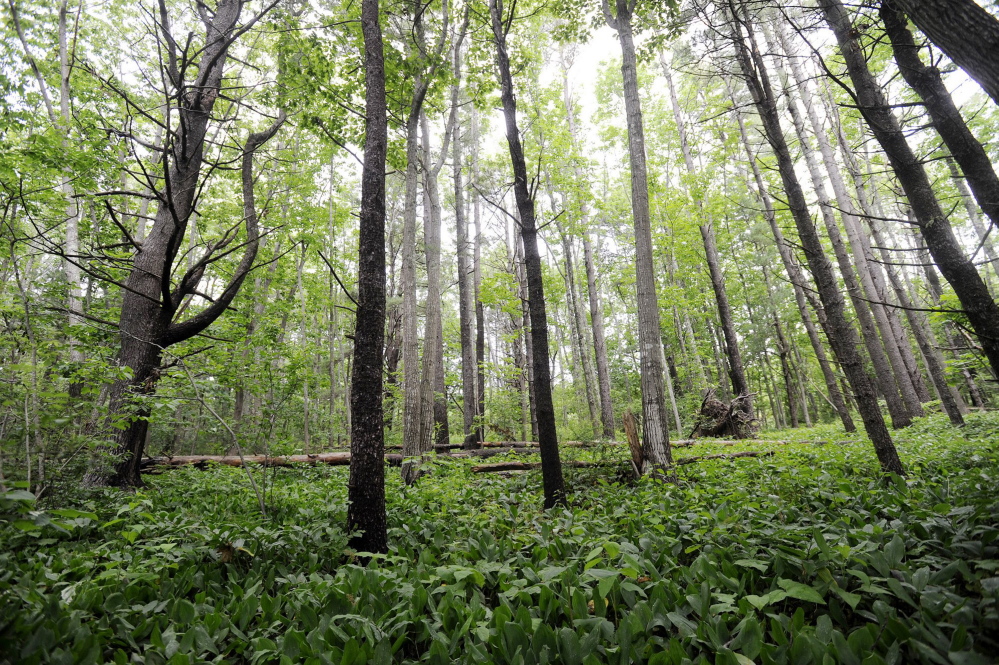AUGUSTA — For the second time in two years, Gov. Paul LePage is using voter-approved bonds as a bargaining chip in his policy battles with the Legislature, a strategy that could have implications for dozens of land conservation projects across the state.
A LePage administration official confirmed Tuesday that the governor is withholding $11.4 million in bonds for the Land for Maine’s Future program. The move, which drew sharp criticism from land conservation advocates, is aimed at gaining political leverage with lawmakers as LePage pushes to increase timber harvesting on state-owned lands in order to pay for residential energy-efficiency programs.
Roughly $6.5 million in LMF bonds approved by voters in 2009 will expire if unsold by the end of the year.
“He is not interested in selling more bonds at this time,” Chandler Woodcock, commissioner of the Department of Inland Fisheries and Wildlife, said during a meeting of the LMF board. “He is very interested in making certain the heating needs of the people of the state are met for the winter season, and part of the solution is … additional cutting and harvests from timber around the state.”
While expected, the news was nonetheless met with dismay and even anger among the representatives of conservation deals in the LMF pipeline. More than a dozen projects already approved by the board were expected to close by year’s end, contingent on LMF funding.
Among them is a project to conserve 215 acres around Knight Pond and Blueberry Hill in Cumberland and North Yarmouth.
“It’s definitely frustrating because we have been working for two years on this project,” said Penny Asherman, president of the board of the Chebeague and Cumberland Land Trust. “This was the last of the funds we needed in order to close, so this puts us in limbo.”
THIRTY LAND PROJECTS AWAIT FUNDS
Knight Pond was among 30 land projects – encompassing nearly 50,000 acres and $9.1 million in LMF funds – that were accepted by the LMF board last July. Those projects will now compete for a share of $2.2 million in available funds.
In a statement, LePage spokesman Peter Steele said the governor does support some LMF projects.
“The governor and staff are reviewing the LMF board’s approved projects to better understand the financial needs of the program,” Steele said. “Many projects do not require funding until 2016 and 2017. It is within the governor’s authority to issue bonds within five years.”
The LMF program has helped conserve more than 500,000 acres throughout the state since 1987, through land sales or conservation easements. The majority of those lands were working forest, farmland or commercial waterfront.
The program is financed through bonds approved by voters and requires that all LMF lands provide access to the public for recreational activities such as hiking, hunting or fishing.
LMF BOARD HISTORICALLY APOLITICAL
In 2013, LePage withheld voter-approved bonds for the LMF and other programs in a successful bid to repay hospital debt.
LePage is less enthusiastic about land conservation than his predecessor, Democratic Gov. John Baldacci. Steele said LePage “is not interested in purchasing additional state land.” In actuality, many LMF projects keep land in private hands.
The governor’s stance raises doubts about the long-term future of a program that has enjoyed broad support among voters, landowners, conservation groups and sportsmen. The LMF board chairman, William Vail of Saco, questioned why the nonpartisan program seems to be caught up in political maneuvering.
“Going way back to the creation of the (LMF) board, it was clear that it was designed to be separate from politics and political strategy,” Vail told Woodcock. “The notion of holding those funds hostage until he accomplishes some element of his political agenda just seems inappropriate to the chairman.”
‘DOOMING’ CONSERVATION PROJECTS
Although not directly connected, LMF funding is now wrapped up in the political fight over LePage’s plans to increase logging on state-owned lands in order to help convert to more energy-efficient home heating systems.
Last year, lawmakers rejected a LePage proposal to tap timber revenues for heating programs. Opponents said the state already has such a program in Efficiency Maine, and they were wary of redirecting funds that now finance programs of the Maine Bureau of Parks and Lands.
The administration plans to submit similar legislation this year to redirect $5 million in timber revenues to home heating programs. But LePage’s plan to increase annual harvesting on state-owned lands from 141,500 cords to 180,000 cords is running into stiff opposition in the Legislature.
Several Democratic leaders promptly denounced LePage’s decision to link the two issues.
“The governor is dooming Land for Maine’s Future projects to failure,” House Majority Leader Jeff McCabe, D-Skowhegan, said in a written statement. “These are voter-approved bonds. He’s putting land conservation projects in jeopardy to push forward an unrelated plan to harvest timber from more public lands. Enough is enough.”
PENDING PROJECTS FACE DISRUPTION
It was unclear Tuesday what will happen to LMF projects in the pipeline or how the board will move forward with funding decisions. LMF Director Sarah Demers said Tuesday that program staff will continue to accept and evaluate funding requests.
Several leaders of conservation groups said they may have to try to renegotiate closing dates with landowners. Others expressed concerns about having to go back to donors who supported a project in part because it was part of the popular LMF program.
Theresa Kerchner, executive director of the Kennebec Land Trust that is seeking LMF funds to preserve 165 acres of wooded hills just behind the State House in Augusta, said she fears the uncertainty could dissuade landowners from negotiating with conservation groups.
Karin Tilberg, deputy executive director of the Forest Society of Maine, noted that many LMF projects actually help the forest products industry. She gave the example of one landowner seeking LMF funds for a conservation easement on 7,200 acres that would remain a working forest.
“They came to us and to the state and said, ‘Help us,’ and they are relying on this program to help them grow their business, buy more forestland and put it into forestry management,” Tilberg told board members. “Not knowing what’s going to happen is a detriment to good business planning.”
HOME HEATING GETS MORE PRIORITY
But Steele criticized some of those same conservation groups for opposing the governor’s proposal last year to use timber revenue to pay for home heating programs.
“The state already has 800,000 acres of public land, but Mainers need help upgrading to more energy-efficient systems that would make it much more affordable to heat their homes,” Steele said. “Especially after the brutally cold winter we just endured, supporting a proposal to help keep Mainers warm should be a no-brainer for these organizations.”
Kevin Miller can be contacted at 791-6312 or at:
Twitter: KevinMillerPPH
Send questions/comments to the editors.





Comments are no longer available on this story